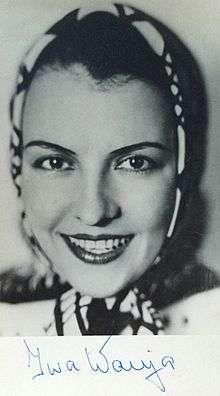Iwa Wanja
Iwa Wanja (10 October 1905 – 26 June 1991) was a Bulgarian actress based in Germany.[1] She moved to Berlin to pursue her career, appearing in around thirty German films. Married to Norbert Schultze, German composer, best remembered for having written the melody of the World War II classic Lili Marleen.
Iwa Wanja | |
|---|---|
 | |
| Born | 10 October 1905 |
| Died | 26 June 1991 (aged 85) Berlin, Germany |
| Nationality | German |
| Other names | Ivanka Nikolova Yanakieva |
| Occupation | Actress |
| Years active | 1925–1954 (film) |
| Spouse(s) | Norbert Schultze (m.1943) |
| Children | Norbert Schultze Jr., Kristian Schultze |
Life and career
In 1937, Wanja appeared in the Nazi propaganda film, Urlaub auf Ehrenwort (Holiday on Parole, also known as Furlough on Parole).[2]
Sometime around 1943, she wed German film composer Norbert Arnold Wilhelm Richard Shultze. They had two sons together. During their marriage, she penned the libretti for several of his compositions for the stage.[3]
Selected filmography
- Women of Luxury (1925)
- A Sister of Six (1926)
- The Woman's Crusade (1926)
- I Liked Kissing Women (1926)
- Weekend Magic (1927)
- The Long Intermission (1927)
- The Marriage Nest (1927)
- The Prince's Child (1927)
- Girls, Beware! (1928)
- The President (1928)
- The House Without Men (1928)
- Polish Economy (1928)
- Dear Homeland (1929)
- The Right of the Unborn (1929)
- From a Bachelor's Diary (1929)
- Josef the Chaste (1930)
- The Court Concert (1936)
- Captain Bay-Bay (1953)
- A Life for Do (1954)
gollark: Yes, it ended, after running for 3 minutes and 42-ish seconds.
gollark: The Soviet national anthem only lasts 3 minutes anyway.
gollark: I don't actually *listen* to voice chat.
gollark: What?
gollark: ++tel graph
References
- Kester p.208
- Giesen, Rolf. Nazi Propaganda Films: A History and Filmography, p. 227. Jefferson, North Carolina, McFarland & Company, Publishers, 2003.
- Letellier, Robert Ignatius. Operetta: A Sourcebook, Vol. II, p. 773. Newcastle upon Tyne, United Kingdom: Cambridge Scholars, 2015.
Bibliography
- Bernadette Kester. Film Front Weimar: Representations of the First World War in German Films of the Weimar Period (1919-1933). Amsterdam University Press, 2003.
This article is issued from Wikipedia. The text is licensed under Creative Commons - Attribution - Sharealike. Additional terms may apply for the media files.